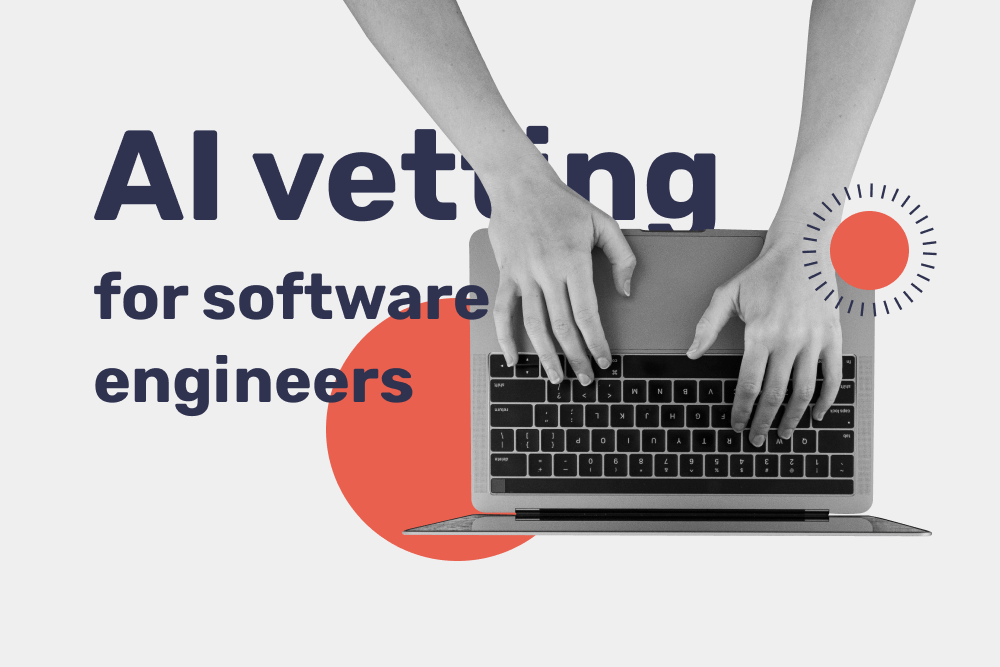According to statistics, we spend most of our phone time surfing apps. From high engagement to mind-blowing revenue estimates of over $900 billion dollars in the next three years, the value of building mobile products is undeniable.
There are different platforms and technologies used to empower next-generation applications. However, regardless of the stack your tech team chooses, it’s even more important to hire mobile app developers that can leverage the full power of these tools.
In this post, we will take a look at cultural fit and technical developer interview questions that will help business owners hire an app developer capable of building complex projects.
5 Cultural Fit Interview Questions For Mobile Developers
Although cultural fit questions might not seem relevant when testing a candidate’s development skills, in reality, they are extremely valuable for talent managers. There are several reasons why business owners should include these types of questions:
- They are impossible to cheat and help employers get a grasp of a candidate’s personality.
- They help a developer choose whether the company is the right fit and protect business owners from high talent churn-out rates.
- They are amazing icebreakers that help establish a comfortable mood in the room before moving on to the technical section of the interview.
Here are the cultural fit junior and senior developer interview questions we recommend asking mobile application developers:
#1. Describe your most challenging programming project. How did you handle it?
This question gives talent managers a handful of insights about candidates, namely:
- Understanding which parts of programming a developer enjoys least and most. Having this knowledge will help business owners optimize responsibilities and make sure a coder enjoys the terms of collaboration.
- Assessing a programmer’s stress-resistance and problem-solving skills. Highly skilled candidates know how to find creative, out-of-the-box solutions to deal with bottlenecks. Similarly, lower-tier professionals are prone to emphasizing the blunders of their teammates rather than fixing their own shortcomings. After asking a mobile app developer to describe a challenging project, you will know which side of the spectrum a candidate is at.
- Discovering the depth of the candidate’s experience. For juniors, basic app development assignments can already be stressful whereas experienced programmers aren’t taken aback easily. That’s why finding out which projects coders consider stressful is helpful for finding out how skilled in programming and self-management they are.
#2. What management style do you thrive under?
This is not the type of question a candidate can get wrong — however, it’s an important one for talent managers. Tech teams are often underestimating the power of recognition and praise in the workplace — although, according to a Glassdoor survey, 53% of professionals would stay at their previous jobs longer if managers appreciated them more.
By asking a candidate to describe her ideal management style, talent managers get insights that will contribute to efficient collaboration in the future.
#3. Why have you decided to join the company?
This is, by far, one of the most popular cliché application developer interview questions in talent management — however, in my opinion, it’s still highly relevant. Why? Mainly, because modern technologies made applying for jobs too easy, so developers might not bother to read application developer job openings or get to know the company before interviewing.
By asking a candidate to briefly explain why she decided to apply for the opening, you will see how engaged and thorough a developer was about researching your project. If a professional showed enough commitment before being onboarded, such a developer will likely be more dedicated in the workplace as well.
#4. What are your favorite mobile development blogs/influencers?
This question has two important functions. For one, it helps find out how passionate a developer is about programming and continuous learning. Programmers who don’t think about mobile development outside of the workplace will have a hard time naming resources they enjoy following — that alone is a major passion and commitment red flag.
Other than that, such an open-ended question gives candidates a possibility to talk about things they enjoy, setting a positive vibe for the call.
#5. How would you delegate a task to a junior?
This question helps talent managers estimate how well job candidates prioritize work, whether they are open to managerial positions, and how they would handle assigning tasks to others.
Ideally, a business owner should be looking for a candidate who recognizes the importance of documentation and guidance in delegation and is open to the idea of helping teammates grow.
For more behavioral and problem-solving questions, take a look at our guide on software developer interview questions.
10 Technical Questions to Ask Mobile App Developers
Ensuring cultural fit helps company managers save a lot of time and money when hiring mobile developers. However, other than assessing a candidate’s communication and leadership skills, a business owner needs to make sure that a programmer he’s hiring is well-versed in app design, testing, and maintenance.
Here are 10 mobile developer interview questions that reveal how skilled an application development job candidate is.
#1. What is ANR and how can a developer avoid it?
ANR is short for “application not responding. It’s a dialogue box that pops up if an app is frozen for over 10 seconds.
The main way to avoid ANR is by reducing the number of activities performed by the core UI thread. It’s a standard practice to create separate threads for resource-draining tasks — such as database connections or complex computation operations.
#2. What information does a mobile developer rely on before coding?
Skilled mobile app developers start a project only after getting the wireframe, list of technical and business requirements, and basic UI artwork from the project manager and designers.
This way, a programmer reduces the risk of wasted effort and gets a clear understanding of the features that business owners expect of the project.
#3. What is the difference between responsive and native application design?
A developer with an understanding and appreciation for application design is a valuable asset to a tech team. That’s why it’s a good idea to include a design-oriented question like telling the difference between native and responsive products in the interview.
When designing native mobile apps, tech teams need to follow the guidelines created by the OS development team — Apple or Google.
Responsive apps, on the other hand, are similar to web applications — so much so that Google indexes them and puts them in search rankings.
Both native and responsive applications offer unique tools for engaging with users — that’s why it’s a standard practice to hire iOS developers and Android programmers who can build both.
#4. How does a developer port an application to different platforms?
In order to save time and structure the project cohesively, programmers create a unified architecture for all platforms.
However, the development team should be mindful of platform-specific differences — screen dimensions, design distinctions, and programming languages for app development. Whenever possible, developers want to reuse the codebase — awareness of code reusability is especially important when you hire Android developers.
#5. Which platform would you recommend for mobile development?
Although there’s room for variation, the answer you want to hear is cross-platform application development. At the end of the day, a developer should be prepared to launch products for different operating systems since that’s a way for business owners to reach as many users as possible.
A few good follow-ups to the question are:
- Were there any challenges teams you previously worked with faced in cross-platform app development? How did you tackle them?
- Which tools and project management methodologies do you use to build cross-platform products?
- Which platform would you recommend to start with or make a priority?
#6. Explain my application idea to me as if I know nothing about it.
Talent managers use this question to understand whether a developer-to-be understands and is passionate about the scope of the project. If a job candidate doesn’t understand the purpose of the product you are about to build, it’s better to keep looking for the right fit.
Other than that, such a question will give you an understanding of how good the idea is in the first place. After all, if no developer you interview understands it, you’ll have a red flag that the app’s concept needs improvement.
To ask developers platform-specific interview questions, take a look at our list of best developer interview questions and answers for iOS and Android programmers.
#7. Share a link to your portfolio or GitHub repository
To make sure a developer you are interviewing is not a beginner pretending to be a professional, make sure the candidate has a handful of completed projects under his belt. To this end, asking to share a portfolio is a reasonable request.
Other than that, you can ask programmers to give a link to their GitHub repository. Seeing how many followers they have, as well as the projects they contributed to is a powerful indicator of a candidate’s expertise.
#8. How long does it take to add integrations (like Google Analytics) to a mobile app?
It’s a trick question that does an excellent job of calling out pretenders. While “adding integrations” seems a complex process, in reality, it’s quite straightforward.
So, if a programmer answers the question with 1 week, 1 month, or other extended time frames, that’s how you know they are not right for the job. A realistic answer would be “from 30 minutes to an hour”.
#9. What is your approach to writing application documentation?
Hiring a developer who knows how to write clear and easy-to-follow documentation will improve scaling and save the entire team a lot of stress. That’s why it’s a good idea to ask candidates to elaborate on the strategies they use to document progress. Here are a few answers that would mean a programmer in front of you is experienced and skilled:
- Separating marketing and technical materials. Leave promotional content to marketing materials and keep documentation concise.
- Use user workflows as the documentation cornerstone. Write posts that cover main action sequences within the app.
- Collaborating with professionals when needed. While developers can film excellent feature demos, most of them aren’t excellent writers. That’s why requesting feedback from content creators improves the readability of documentation.
#10. Will you not outsource application development?
You might be wondering if asking such a question is necessary — however, the cases of app developers outsourcing coding to others are painfully common.
Such an approach makes it harder for business owners to find a person responsible for code changes and can compromise app security (since you won’t even know how many professionals have access to the codebase).
Conclusion
Hiring a mobile application developer is a responsible decision — that’s why you want to add both technical and cultural fit application development interview questions and answers to candidate screening. Taking your time to screen candidates and talk through tworkflows helps ensure a productive collaboration.
To hire mobile application developer team composed of top-notch engineers, consider starting an office abroad. Sourcing talent from Ukraine, Argentina, or Mexico is an efficient way to cut operating costs — see this for yourself by running our budget calculator.
Find out how to start and manage a global team remotely by contacting Bridge. Our team will consult you on scouting talent and maintaining an office abroad — leave a message!



